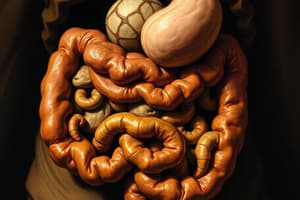Podcast
Questions and Answers
Which organ produces enzymes like amylase and lingual lipase to start the breakdown of carbohydrates and fats?
Which organ produces enzymes like amylase and lingual lipase to start the breakdown of carbohydrates and fats?
- Salivary glands (correct)
- Pancreas
- Liver
- Stomach
What is the main function of the esophagus in the digestive process?
What is the main function of the esophagus in the digestive process?
- Absorbing nutrients
- Breaking down carbohydrates
- Digesting proteins
- Facilitating movement of food to the stomach (correct)
Which substance in the stomach helps break down proteins?
Which substance in the stomach helps break down proteins?
- Lingual lipase
- Bile
- Hydrochloric acid (correct)
- Amylase
What is the role of the small intestine in digestion?
What is the role of the small intestine in digestion?
What is the function of enzymes from the pancreas and liver in the small intestine?
What is the function of enzymes from the pancreas and liver in the small intestine?
How does saliva contribute to the digestion process?
How does saliva contribute to the digestion process?
Study Notes
Digestion: The Process of Breaking Down Food
Your digestive system is a complex network of organs that work together to break down food into nutrients your body can use. This process involves both mechanical and chemical digestion, which occurs in several stages from the moment you take your first bite until the waste products are eliminated from your body. Here's an overview of how your digestive system processes the food you consume:
-
Mouth: Digestion begins in the mouth as you chew your food. This helps to mechanically break down larger pieces into smaller ones. Saliva, produced by salivary glands, contains enzymes such as amylase that begin to break down carbohydrates, and lingual lipase that starts the process for fats.
-
Esophagus: Once you swallow, food passes through the esophagus, a muscular tube that facilitates the movement of food from your mouth to your stomach.
-
Stomach: In the stomach, the food is mixed with gastric juices, which contain hydrochloric acid to break down proteins and enzymes that further break down carbohydrates. The stomach also churns the food, helping to further mechanically break it down.
-
Small Intestine: The partially digested food then enters the small intestine, where it is mixed with enzymes and bile from the pancreas and liver, which further break down proteins, carbohydrates, and fats. The walls of the small intestine also absorb the nutrients from the food into the bloodstream.
-
Large Intestine: The waste products of digestion, now in a liquid form, move into the large intestine. Here, water is absorbed, and the waste is transformed into solid, undigested materials, which become feces.
-
Rectum and Anus: The feces are stored in the rectum until they are expelled from the body through the anus during a bowel movement.
The process of digestion is intricate and involves various organs and secretions to ensure that the nutrients from your food are efficiently absorbed and utilized by your body. Problems in the digestive system can lead to a range of health issues, including colitis, diverticulitis, gastroenteritis, heartburn, and ulcers. If you have digestive issues, it is recommended to consult your doctor.
Studying That Suits You
Use AI to generate personalized quizzes and flashcards to suit your learning preferences.
Description
Learn about the intricate process of digestion, from the mechanical and chemical breakdown of food in the mouth to the absorption of nutrients in the small intestine and the elimination of waste through the large intestine and anus. Understand the role of various organs and enzymes involved in ensuring efficient digestion.




